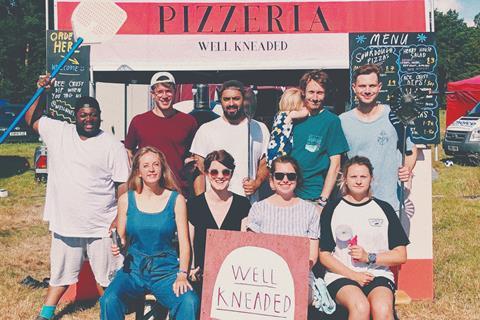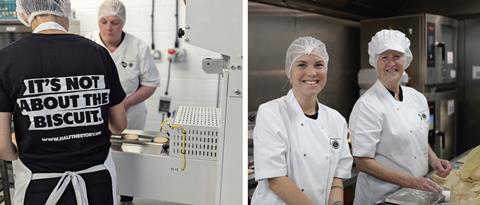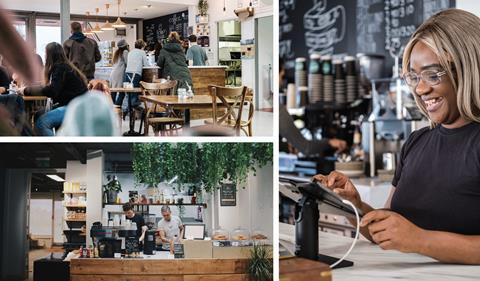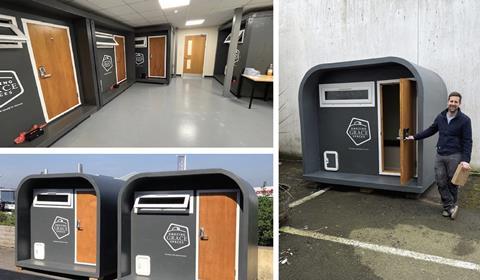Business isn’t just about the bottom line. All across the UK, Christian-run companies are providing employment opportunities for people on the margins. And proving that enterprise can be about restoration, dignity and second chances
1. Well Kneaded
London
At the core of this award-winning pizzeria is a heart postured towards the “oppressed and voiceless” youth that founder Bridget Callaghan first encountered while working for a church on a low-income estate in south-west London. “Spending time with the young people on this estate opened my eyes to a section of society that were sidelined,” she explains. As she watched a group of young people kick a ball around, she wondered: What do they like, that I like too? The answer came to her quickly: “Food…what food do they like? Jerk chicken…I like chicken, but I don’t really fancy cooking it all day. How about pizza…?”
There was no strategy, she concedes, just an impatience for change and the faint concept of a small business that would involve and empower young people. God brought flesh to the bare bones of her inklings, she says: “as is his way”. The journey was unconventional: a vintage Citroën van purchased from eBay, long hours learning to make dough and legal battles to secure permission to trade. Yet every time a door almost closed, another opened. “It was God’s heart for these young people ushering us forward.”

There is often trust required from social enterprises to invest in marginalised people, uncertain that they will grow into that investment. Well Kneaded importantly highlights the reverse: the trust the marginalised must give in return. These are teenagers who, mostly through no fault of their own, have been stifled, let down and disappointed by the environment in which they grew up. One young man exemplifies this. Aged 17, with his mother constantly working and no other real support system, he had sent out countless job applications but never even reached the interview stage. When Callaghan and her team started their food truck, the business wasn’t making any money. She told him: “Just come. We can’t pay you right now because we’re not paying ourselves, but as soon as we sell enough and have money, you’ll be the first to be paid.” Irrespective of a young life that served as a case against it, he chose to trust them. Initially, he struggled with communication, so they started him on the pizza-making line. Gradually, he gained confidence. “You wouldn’t recognise him now,” Callaghan says of his transformation.
Four years ago, Well Kneaded opened a restaurant in Earlsfield, London, a visible marker of the growth the enterprise has nurtured. In that period, one of the young man’s old teachers visited, reflecting with Callaghan on the opportunities she feared would never materialise for her former student. For all three – the former teacher, Callaghan and the transformed young man – what was an anxiety over a lack of opportunity, a restless desire to address it, and the lived cost of such has been transformed into a shared joy they can all attribute to the enterprise Callaghan willed, and for which God made a way.
Find out more: wellkneadedfood.com

2. Half the Story biscuits
Nottingham
Half the Story, a Christian-run baking enterprise, produces biscuits which are served in fancy London banks and the boardrooms of some of the UK’s biggest car manufacturers. But the business side of this operation is exactly that: just half the story.
Articulating the focus of their company, Adam Kirkup, head of communication, says that their business model is: “to employ as many people as possible and spend as much time with them as possible”. In the unforgiving environment of business, where everything bows to efficiency, that may sound counterproductive. But Half the Story are about far more than just profit.
When Matt and Sam Parfitt founded Grace Enterprises, they sensed God’s call to build something that went beyond simply employing people. They want to create businesses that truly supported people. So in 2023, Half the Story was launched as a joint venture between Grace Enterprises and Green Pastures to create supportive jobs for people who have faced homelessness. Starting out of a church kitchen in Nottingham, they began with a small team of bakers, and that seed has since grown into a successful bakery producing a million biscuits a year for corporate events, boardrooms, and high-profile venues.
Kirkup explains: “The idea was: can we prove that this model works – employing people that wouldn’t be employed elsewhere, building up a business that essentially takes care of itself?” Currently, they employ 22 people from backgrounds that would otherwise make gaining employment very difficult: those experiencing homelessness, recovering from addiction and refugees fleeing war.
It enabled me to land a job, break away from addiction and live independently
“Everyone has access to mentoring and something called the Living Life Review,” Kirkup says. This includes a regular check-in covering twelve areas of holistic support, from relationships and finances to hopes and aspirations. For some of the refugees from Ukraine, it has also included English lessons.
Anthony, who came from a background of homelessness and addiction, cites this targeted support as the reason he managed to rebuild his life: “It enabled me to land a job, break away from addiction and live independently.”
At Half the Story, the two halves – business and human – feed into each other in a delicate cycle. The bakery needs to thrive as a business to continue providing meaningful work, while the employees need to show up, learn and contribute for the business to succeed. Kirkup is candid about the challenges this can pose: “There have been times when we’ve had to deal with absence challenges because people are coming from chaotic lifestyles.” By being patient in giving people a chance, the enterprise proves that individuals from the most marginalised circumstances can be relied upon and contribute meaningfully. Perhaps Half the Story’s greatest work is in reframing these perspectives.
Find out more: halfthestory.uk

3. The Mess Café
Manchester
Which of these are you? The free-spirited adventurer who can stroll into a restaurant guided by nothing but intuition, sit down in what could be deemed reckless abandon and order the first thing that catches your eye? Or perhaps the overly diligent, who won’t so much as touch a menu until you’ve combed through every Google review and cross-referenced the chef’s LinkedIn endorsements before daring to order an appetiser?
If you were the latter, hunting Manchester’s finest double macchiato, deference to Tripadvisor’s wisdom would have ushered you to the city’s The Mess Café. Its sister spot, Neal Street Espresso, sits a couple of hundred miles down the M1 in Covent Garden, London and also boasts five stars. Both are highly regarded coffee shops but, according to their Instagram bio, it’s not about the coffee. It’s about the people who make it.
The Mess Café and Neal Street Espresso are enterprises of Christian charity, The Message Trust, and are staffed by men and women coming out of prison. Their employment is a crucial step towards rebuilding their lives. The Message Trust’s journey into enterprise started when its prison ministry exposed a gap. Men and women who found faith behind bars often lost their discipleship journey once released into the same circumstances they left behind. Their CEO, Sam Ward, explains: “We began to ask: could we ready them on the inside, pick them up at the gate, plug them into housing and a church family, and then give them a job?” That question birthed a network of social enterprises, including two very good coffee shops.
The job is the centrepiece of The Message Trust’s offer, but not the whole piece. Staff picked up from the prison gates are supported to restore familial relationships, seek freedom from addiction and taught practical life skills, such as budgeting. Building on the discipleship they received in prison is equally intentional. “We’re ensuring that they’ve got a church that feels like home. They also meet together for Bible study before the business opens a couple of times a week,” says Ward.
Both businesses operate on a two-year employment model, which Ward admits can carry its own tension. Treading the fine line between empowering employees to discover skills and strengths that hardship has long suppressed, and fostering a dependence on the support and investment the enterprise provides, is a constant challenge. For some participants, the prospect of leaving the security of the programme for the uncertainty beyond can be unsettling. “We’ve seen people almost sabotage their onward journey, hoping they might be able to stay with us long-term,” Ward says. But despite such challenges, the growth is tangible.
Take Merlin, who was serving time in Styal Prison when she encountered one of The Message Trust’s workers, who began preparing her for life beyond incarceration – helping her secure housing, reconnect with community and step into work. Today, Merlin doesn’t serve coffee in The Mess Café, she leads it. Over the years, the shop has had a number of managers, but staff say it has never been as profitable, or as high-quality, as it is currently under her leadership. Now, Merlin is discipling and mentoring others coming through the same programme. More than transformation, the replication seen in Merlin’s story represents “a precious, precious thing” to Ward.
With every flat white and double espresso, the employees at The Mess Café and Neal Street Espresso affirm what God has already ordained to be true: everyone is worthy of another chance.
Find out more: themessmanchester.co.uk and nealstreetespresso.com

4. Amazing Grace Spaces
Wales
Somewhere between a bus stop and a bedsit, you might catch sight of them: eight-by-six-foot solar-powered pods, perched in car parks or tucked behind your local corner shop. As far south as Plymouth and as far north as Kendal in the Lake District, these small, self-contained units are offered as safe spaces to people in need of temporary accommodation. The operations and design manager of Amazing Grace Spaces, Stuart Johnson, describes them as “offering something as an interim to reach people disengaged with society”.
The organisation first started as a night shelter in Newport, Wales, but quickly found they were unable to provide rough sleepers who were battling addiction or struggling with mental health with what they needed. It was often unsafe, or simply unbearable, for such people to be around large groups. The solution was found in creating small, secure places of refuge in the form of shipping containers. The aim is to provide a temporary bridge between homelessness and more permanent rehousing.
In partnership with a back-to-work programme for people leaving prison, experiencing homelessness or long-term unemployment, Johnson oversaw the design of the first prototype – a self-contained unit, fitted with a chemical toilet, lighting, a bed and a phone charger. Since then, 34 pods have been distributed across the UK, with another eight on the way.
It is beautiful to bring people out of that mess and into the light
Johnson’s priority is ensuring the pods are created and placed where they’re needed. Once they arrive, it’s people like Philip, at the Freedom Centre in Devon, who work directly with those who live in them. Both men reach for the image of a ladder in articulating the purpose of the pods. Johnson explains that their aim is: “to support people to get on the ladder. And if they fall off, pick them up and put them back on again.”
Philip explains that the pod provides access to the first rung. “For a lot of people, it’s too much to go [straight to] rung five,” he adds. He recalls one conversation with a long-term rough sleeper who told him: “I’m never going to move from the streets to a house. Give me something like a shed if you want me to be safe.”
People often come into Amazing Grace Spaces in very difficult situations, both mentally and physically. The pods give them a safe space to start recovering from the effects of sleeping rough – the loss of dignity and self-worth that comes with homelessness, as well as finding it hard to cope with routines and rules.
Philip sees the pods as “a stepping stone into another solution”, saying that they often use them “as a bit of an assessment centre: bringing people in, seeing how they get on. Often, they’ve got complex needs. Can we stabilise their drug use, their alcohol use? Are there any other issues?”
For Johnson, it all comes back to the messiness of humanity. “Is it a bit of a mess? Yeah. But you’re being with real people, in that mess, at the moment. And God takes us into that place. It is beautiful to bring people out of that mess and into the light.”
Find out more: amazinggracespaces.org







































No comments yet